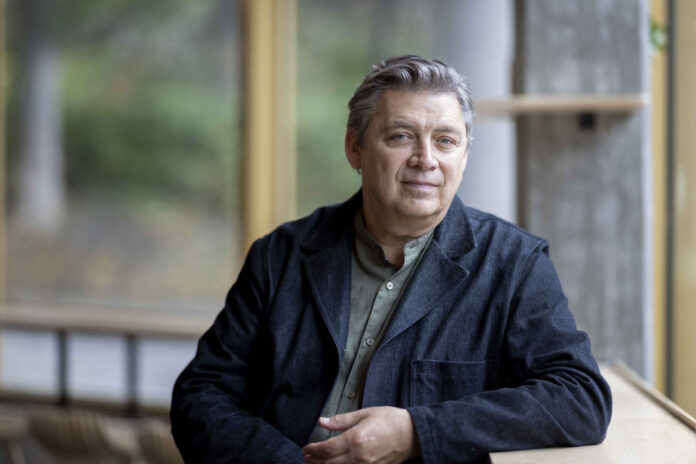In his new novel, Qimmik, Michel Jean continues to tell parts of Indigenous history by showing how the past sheds light on the present. And, more than ever, it reminds us that this story is also ours.
We met Michel Jean at the start of the week in a café very close to TVA, where he is still the midday anchor. It’s not easy to catch the popular author for an interview – on social media, he calls himself “the wandering Innu.”
Since mid-September, in addition to a few days in Toronto, he has made two long stays in France to promote Tiohtià:ke, (just launched at Seuil, released here in 2021 by Libre Expression) . Thanks to Kukum, which is close to 40,000 copies sold there, Michel Jean has become the darling of booksellers and readers. “It’s huge for a nobody, who hasn’t really had a media presence. »
In fact, for two years, his dear Almanda has also taken him to Germany, Lebanon, Mexico, Estonia, Sweden… And it’s not over, since the book has just been translated into Arab. “And also in Croatian, Russian, Spanish, English,” he adds.
Michel Jean has been repeating it for three years: Kukum changed his life. “What it gave me was freedom. » But since he hasn’t quit his job as a journalist, his life at the moment is pretty much about work. And he’s not complaining.
“I’ve been writing for a long time and it was my dream to travel with my books, to create links around literature. So when someone says to me: would you like to come to Italy for two weeks to talk about your books… well yes! »
Michel Jean devoted two years to Qimmik, which, after Kukum, tells another story of forced sedentarization: that of the Inuit during the 1960s and 1970s, who were forcibly grouped into 14 villages in the territory of Nunavik. A history marked by the slaughter by police authorities of thousands of Nordic sled dogs – the qimmik –, which left deep scars among the Inuit.
This bond with dogs, without which the Inuit simply could not survive, is the common thread of this novel which takes place over two eras. It follows a young couple in the Far North during the 1960s, as they travel and search for food, and the questions of a lawyer today, who is defending a homeless Inuk suspected of murder.
A great animal friend and dog lover, Michel Jean is horrified by this massive slaughter which was carried out largely by police officers from the Sûreté du Québec. “I’m trying to imagine what it was like when the police showed up…” he slips.
“How could we think that to stop people from leaving, we had to kill the dogs? How did someone, somewhere in Quebec, think this was a good idea? Let’s see. We did not respect these cultures, we did not respect these people. Something inhumane happened. »
What shocks him even more: that this massacre took place in a recent past, and not in “1800 or so”. He also recalls that the Inuit are not subject to the Indian Act, it was in Quebec that this decision was made. “Identitarian nationalists often hold Ottawa responsible for problems related to Indigenous people, but colonialism happened in Quebec too. In America, it was done in Spanish, Portuguese, English, and French. »
The idea is not to blame, but to tell this story which is not taught anywhere, “so that Quebec does not absolve itself of its historical responsibility”.
True to his style, Michel Jean “hid” all of this in a smoothly completed novel, which is anything but didactic. And as is often the case, it is strong women that he portrays – the narrator Saullu, like Almanda, has a “badass” side that he likes. “It comes naturally to me, I just have strong women in my environment! And the character of the lawyer, Eve, is our view of justice. But I liked a lawyer better than a lawyer, I don’t know why! »
Eve is also caught up in her origins, as happened to Michel Jean a few years ago. He pauses for a moment. “Did you like the ending? » Excellent question: the last pages of Qimmik are indeed very moving, when everything he has sown in the book makes sense.
“I love him anyway. I saw the scene, the grandmother leaning over to smell the dog. He’s just a dog… but that’s the past. But maybe I’m being sentimental. »
The other character of the novel is the territory, which he took great care to describe to convey all its beauty and danger.
“It’s still the end of a way of life, we had to show what they lost. This book is about a tragedy, and the consequences of a tragedy, in a story that I hope is captivating and touching. »
For the future, the author who writes “with his heart” has plenty of literary journeys planned, screenwriting projects – three of his books are being adapted – and is already thinking about the subject of his next novel.
“There will be another one, that’s for sure. The most important thing is the next book. » And he will of course continue to carry these stories on which it has become impossible to “put a lid”.
“Because you know what? They tried a lot of things, and we’re still here. »















